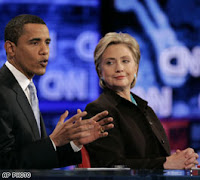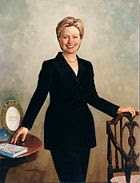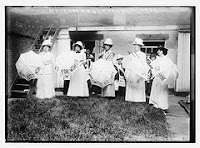Our HuffPo piece is now up, here. Comments, there or here, most welcome, as always!
And to readers and friends who are fervent Obama supporters: I will fervently campaign for your man if he wins. On that, you’ve got my promise.
Our HuffPo piece is now up, here. Comments, there or here, most welcome, as always!
And to readers and friends who are fervent Obama supporters: I will fervently campaign for your man if he wins. On that, you’ve got my promise.
 I’m taking a stand for Hillary. Keep an eye out for my HuffPo piece being posted hopefully early today — I’ll crosspost here when it goes live 🙂 I cowrote it with a close friend, journalist Rebecca Segall. Strength in numbers and all.
I’m taking a stand for Hillary. Keep an eye out for my HuffPo piece being posted hopefully early today — I’ll crosspost here when it goes live 🙂 I cowrote it with a close friend, journalist Rebecca Segall. Strength in numbers and all.
Thank you to everyone who sent me articles and wrote heartfelt comments and emails, in support of both candidates. I am so moved by the passion this election is inspiring in people young, old, and in between. In my opinion, that’s the real win here — a resurgence in civic engagement in a nation where 7 years of an undemocratic regime have profoundly broken our trust.
And may the best of two amazing candidates win.
 That debate made nothin’ any easier. To even the score and balance all my Hillary blogging, here’s an Obama reader to cap off the day:
That debate made nothin’ any easier. To even the score and balance all my Hillary blogging, here’s an Obama reader to cap off the day:
“The Visionary Minimalist: Toward a Theory of Obama-ism” by Cass R. Sunstein, The New Republic
“What Counts as an “Issue” In the Clinton-Obama Race?” by George Lakoff, Huffington Post
(Thanks V., S., others–you know who you are.)
 For the first time in my voting life, I’m torn. In five days, I’ll need to pull a lever in a New York Democratic Primary that matters. And I don’t know what to do. I want to vote for Hillary. I want her to be electable. She moves me. And so does Barack. I like much of what both of them stand for. I want to speak out publicly for one of them. But who?
For the first time in my voting life, I’m torn. In five days, I’ll need to pull a lever in a New York Democratic Primary that matters. And I don’t know what to do. I want to vote for Hillary. I want her to be electable. She moves me. And so does Barack. I like much of what both of them stand for. I want to speak out publicly for one of them. But who?
Every day this week feels heavy with meaning and momentum. Take yesterday. My Wednesday begins with the forum I created for More magazine (“If Hillary Wins…â€) going live. On my way to the luncheon to celebrate Susan Morrison’s new book 30 Ways of Looking at Hillary, scrambling for a public place with wireless so I can email the contributors and broadcast the news, I end up in the great phallic palace, Trump Tower.
At mid-day comes the parmasean emulsion, served up at the restaurant Daniel along with brilliance from Susan Morrison and a number of the contributors to her anthology. Between walnut-crusted fish filet and hot chocolate upside down cake, and chats with Leslie Bennetts and Leslie Savan, I jot down the following:
Among the many comments that served as impetus for Morrison’s book, she says, there’s this one: “I’d sooner vote for a ticket of Britney Spears and Lindsay Lohan that pull the lever for Hillary.†Gross. “I take Hillary personally, too personally,†writes Jane Kramer in the book. Yes, and don’t we all? Letty Cottin Pogrebin, repeating a sentiment oft overheard, notes “Hillary is Presidential, Obama is inspirational; it depends what you’re looking for.†Judith Thurman feels “Hillary is using her husband’s credit card.†Sorry, I don’t buy it. Susan Morrison: “Clearly, we haven’t all collectively figured out what we want from a woman leader.†Personally, I couldn’t agree more.
The day ends with my beloved Only Child coeditor (now a novelist!) sending out her “First and Last Political Email,†voicing her support for Hillary. “Dear Friends,†Daphne writes:
I’m choosing to be thrilled that we have two such qualified candidates vying for the Democratic nomination, and in November I plan to fully throw my support behind whoever is nominated, as I’m sure will all of you (unless I’ve accidentally sent this to Republicans).
That said, I agree with the NYTimes: inspiring plans to start anew and beautiful rhetoric aside, I believe Hillary Clinton is the most qualified to hit the ground running next January. I’ve wavered on my support of her because, though her campaign keeps talking about experience, I’ve never been educated on the nitty-gritty details. So I was happily surprised to receive a quick and impressive rundown recently by one of her full-time volunteers.
I’ve gone through her website and weeded out all the promises and plans, which any candidate can persuasively and confidently lay out. Instead, I’ve highlighted her actual concrete accomplishments. Attached is a brief cheat sheet for anyone who, like me, is leaning toward Hillary, but can’t articulate why.
Feel free to delete it, or to continue your passionate campaigns for Obama, as I know many of you are, and with great reasons. Please don’t reply to this e-mail, and know that I will not send another political e-mail until 2012 (hopefully, not til 2016). I hope I haven’t stepped on any toes.
If anyone would like the cheat sheet, email me (my email’s at the bottom of the blog) and I’ll pass it on. And ok, Girl with Pen, embarrassment of riches notwithstanding, it’s time to take a stand. Stay tuned.
PunditMom bids a bientot to John Edwards, as he drops from the race. (Watch Edwards’ withdrawal speech here. We’ll miss you, John.)
Rebecca Traister goes on video with a round-up of the latest in anti-Hillary slogans and tees (Read more in Broadsheet).
Avis Jones-DeWeever revisits thoughts about Gloria Steinem’s NYTimes op-ed after hearing Gloria tell of the parts that got cut out.
Maya Angelou writes a poem in support of Hillary, and Salon’s Laura Miller sounds off on the battle for literary endorsements.
Caroline Kennedy speaks in a new ad that uses images of President Kennedy and Barack Obama, and Uncle Teddy and Barak appear together on The Today Show.
 I’ve been thinking so much about Hillary these days. And lately, I’ve been thinking about how media coverage of an “intergenerational divide” in women’s support of her may be fueling, and not just documenting, discord among women across generations. I’m very eager to see some analysis of the age divide after primary season is over and we’ve all had a chance to chill.
I’ve been thinking so much about Hillary these days. And lately, I’ve been thinking about how media coverage of an “intergenerational divide” in women’s support of her may be fueling, and not just documenting, discord among women across generations. I’m very eager to see some analysis of the age divide after primary season is over and we’ve all had a chance to chill.
My feelings about Hillary keep evolving. But no matter what you think of her, it’s still hard not to be intrigued by the prospect of a woman in the White House.
As I mentioned here recently, the February issue of More, my new favorite magazine (hey, I’m almost 40!), includes a forum in which I asked women who have themselves accomplished many firsts to weigh in on what a Hillary presidency might look like. I’m pleased to announce that the much extended, online version is now live. Check out the very different perspectives of Margaret Cho, Daphne Merkin, Lynn Harris, Dee Dee Myers, Letty Cottin Pogrebin, Suzanne Braun Levine, Mary Catherine Bateson, Marie Wilson, Gloria Feldt, Pat Schroeder, Pepper Schwartz, Jane Swift, Nell Merlino, Blanche Wiesen Cook, Linda Hirshman, Kellyanne Conway, and Seema Gahlaut–and please feel free to share the link! The forum is rich–far richer than the squabbles we keep hearing about in the news–and I feel it’s so very important to infuse substance, even if speculative, as is the case of this forum, into the public conversation. So, have at it. Please join the conversation and share your comments over at More’s site.
And for an interesting More article on Hillary and the age divide, don’t miss “Our Hillary Problem”. Here, Katherine Lanpher interviews Donna Brazille and asks why some older, elite women voters are ambivalent on Hillary Clinton’s candidacy. I don’t need to refer you to articles on younger women’s ambivalence, because you’ve probably all read them by now.
 Another take–or rather, takedown–on the racegenderpolitics discussion, over at HuffPo. GWP guest blogger Cathy Prendergast wrote more about the CNN website debacle Cho refers to in her post, here. (Thanks to Ann at feministing for the heads up.)
Another take–or rather, takedown–on the racegenderpolitics discussion, over at HuffPo. GWP guest blogger Cathy Prendergast wrote more about the CNN website debacle Cho refers to in her post, here. (Thanks to Ann at feministing for the heads up.)
Addendum: This just in, via Cathy: Toni Morrison to Endorse Obama. As Cathy suggests, “probably her way of taking the ‘Clinton first black president’ remark.” Um, yep.
Young people are giving Hillary Clinton the love, and not just Barak Obama. Just sayin’.
Addendum, later that day: I just read that the NYTimes is endorsing Hillary and John McCain.
 So as part of my participation in the Women’s Media Center’s new Progressive Women’s Voices Project, I’ve been reading up on polls and found something* very interesting to share. Did you know that more men may think our nation is ready for a woman president than women do?
So as part of my participation in the Women’s Media Center’s new Progressive Women’s Voices Project, I’ve been reading up on polls and found something* very interesting to share. Did you know that more men may think our nation is ready for a woman president than women do?
Historically, women and men have felt almost the same about their willingness to vote for a woman from their party if she were qualified for the job. Acccording to survey data from the years between 1958 and 1969, both women and men said they would consider voting for a such a gal, but the men were actually more positive: 50-53 percent of women and 55-60 percent of men answered “YES” when asked whether they would vote for a woman if she were their party’s nominee. Today, of course, post-women’s movement, those numbers have spiked. According to a CBS/New York Times Poll in January 2006, 92 percent of respondents said they would vote for a woman from their party if she were qualified for the job.
But now get this: That same year, 2006, when asked about the U.S. public’s readiness to elect a woman head of state, much smaller percentages said they thought the country was ready (92 percent versus 55 percent in the CBS News/New York Times Poll). And when you analyze these responses by gender, the men come out on top: 60 percent of men versus 51 percent of women think the country is ready for a female Commander in Chief.
So, ladies, what gives? I asked Ruth Mandel, Director of the Center for American Women in Politics, this question. Her answer was telling. Apparently, the same holds true for African Americans (though I have yet to see the actual data). The group that is historically on the outside of the presidency feels less sanguine than the in-group about the public’s readiness to see a member of the out-group at the helm.
Is this some form of internalized oppression, to use a word from back in the day? Or are the out-groups’ intuitions right on? Psychology is deep. And so are women’s–and African Americans’–feelings about the readiness of this country to elect someone other than Another White Male.
But I’d love to know if these percentages have changed now that we’ve been through a few primaries and have seen that, on the Dem side at least, some states have proved themselves ready to put a Hillary or a Barack in office. Anyone seen any more recent data on “readiness perception”? Thoughts?
*Data drawn from a book chapter, “She’s the Candidate!”, by Ruth Mandel, published in Women and Leadership: The State of Play and Strategies for Change, edited by Barbara Kellerman and Deborah L. Rhode (Jossey-Bass, 2007). Full chapter available here.
 Catherine Prendergast is Professor of English and Co-Director of the Ethnography of the University Initiative at the University of Illinois at Urbana/Champaign. She is the author of Literacy and Racial Justice: The Politics of Learning after Brown v. Board of Education, a book Gloria Ladson-Billings called “a breath of fresh air in what has been a very stale atmosphere.†As I think you’ll agree after reading Cathy’s post here, she’s also one of the freshest thinkers on the much-blogged topic of race in this race around. On top of that, she’s a dear friend of mine from graduate school and can twirl a mehttp://www.blogger.com/img/gl.link.gifan pirouette. Here’s Cathy:
Catherine Prendergast is Professor of English and Co-Director of the Ethnography of the University Initiative at the University of Illinois at Urbana/Champaign. She is the author of Literacy and Racial Justice: The Politics of Learning after Brown v. Board of Education, a book Gloria Ladson-Billings called “a breath of fresh air in what has been a very stale atmosphere.†As I think you’ll agree after reading Cathy’s post here, she’s also one of the freshest thinkers on the much-blogged topic of race in this race around. On top of that, she’s a dear friend of mine from graduate school and can twirl a mehttp://www.blogger.com/img/gl.link.gifan pirouette. Here’s Cathy:
Breaking up with Bill
Out of the ashes of the South Carolina Democratic debate, uninspiring in so many ways, I saw a glimmer of hope. It wasn’t in the CNN debate itself or the punditry afterwards, but rather in a related article on CNN’s website which saw the media monolith scarfing down a little humble pie. It seems that within minutes of running a story in which it was speculated whether black women in South Carolina would vote their race or vote their gender, CNN was barraged with angry emails decrying the characterization of black women and their “unique” dilemma. Black women weighed in with the obvious (though apparently not obvious to CNN) point that they might also have other options, including voting on (gasp!) the issues. Did CNN really imagine black women so dumb that they would only perceive two choices in front of them? “Pull this racist crap off” one angry reader responded. But perhaps the most revealing comment came from a white man who wrote “Since Edwards no longer officially exists, as a white male I face the same choice – either I vote my race (Clinton) or my gender (Obama).”
What did this man reveal? Whiteness, plain and simple. That state of being that is invisible and somehow transcendant, allowed to be raceless because it takes place against a continually racialized other. People have been quick lately to recall Toni Morrison’s description of Bill Clinton as our first black president. They’ve been less apt to recall her more substantial observation that white people have always resisted shifting the racializing gaze to themselves. Morrison, for a related reason, refuses to don the mantle of feminist writer just because she writes about women. She finds such labels suspicious: “No one says Solzhenitsyn is writing only about those Russians, I mean, what is the matter with him? Why doesn’t he write about Vermont?”
So when Bill Clinton, in speech the weekend before Martin Luther King Jr. Day, assured listeners that he could well understand why African-Americans would want to vote for the first “intelligent” African American presidential candidate they’ve ever had the chance to vote for, I cringed. Clinton may have been called our first black president, but he certainly was never called our first “intelligent” black president, which is why, of course, he never was black, and was never called white.
Since this is a blog honoring women writers, let me quote one of my favorites, whose words have been bouncing around in my head ever since this primary season began: Susan Sontag in the days after 9/11, when surrounded by those who asked “why us,” famously answered, “Let’s by all means grieve together. But let’s not be stupid together.” What is going to make this current election different, if it is going to be different, is not the presence of a black (male) or (white) female candidate as front-runners for the first time. It will be the continued presence of all the extraordinary people who wrote speedily back to CNN, and in so many words, said, “Let’s by all means vote together. But let’s not be stupid together.” Here’s to those people. They point the way ahead.